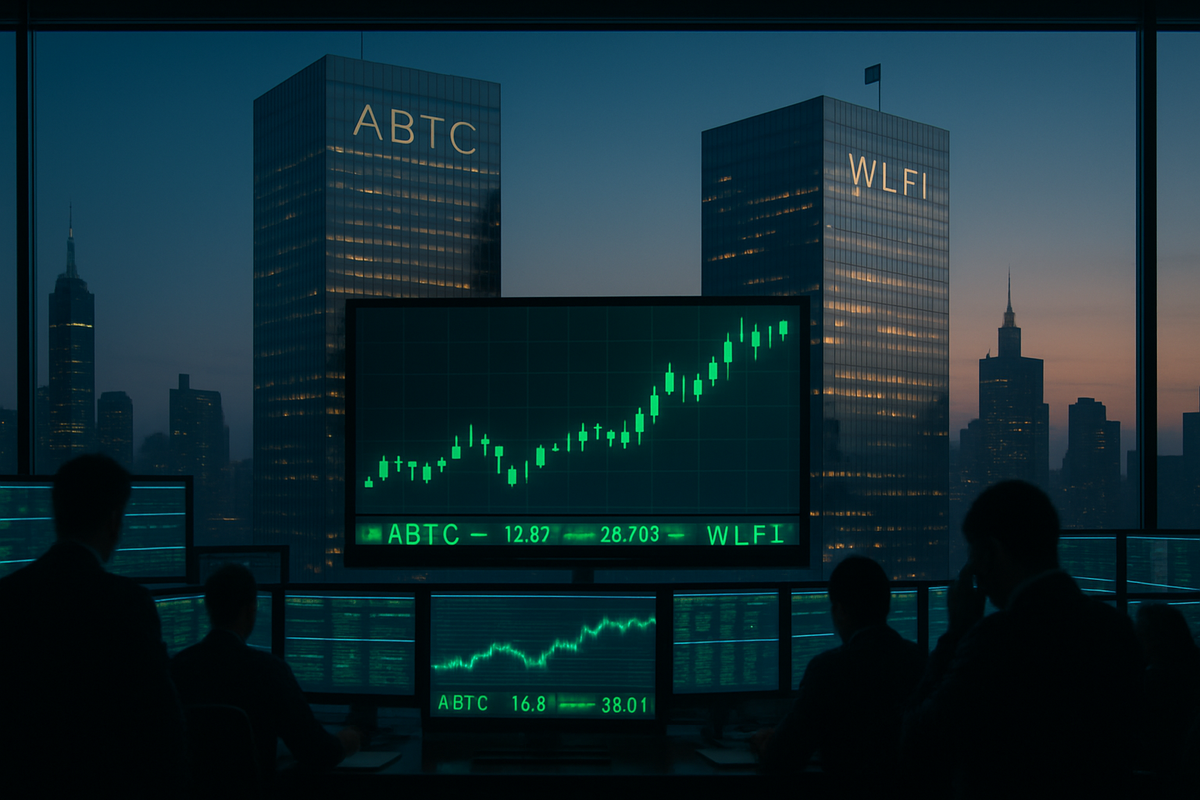Trump Family's Crypto Ventures Roar into Market, Reshaping Digital Finance Landscape

The world of digital finance is abuzz with the high-profile market debuts of two ambitious institutional crypto ventures: American Bitcoin Corp (Nasdaq: ABTC) and World Liberty Financial (WLFI). Spearheaded by members of the influential Trump family, these companies represent a significant foray by traditional political and business figures into the burgeoning, yet often volatile, cryptocurrency market. Their launches mark a pivotal moment, signaling a potential shift towards greater institutional adoption and integration of digital assets within the U.S. financial ecosystem, while simultaneously raising questions about political influence and market stability.
These ventures, encompassing Bitcoin mining and a comprehensive decentralized finance (DeFi) platform with a stablecoin, are not merely new players but are strategically positioned to leverage a unique blend of technological innovation and political branding. The involvement of Eric Trump and Donald Trump Jr. in prominent leadership roles has infused these companies with a distinct "Make America Great Again" ethos, aiming to establish U.S. dominance in the global crypto space. Their market entries have been met with both enthusiastic investor interest and considerable scrutiny, underscoring the complex interplay of finance, technology, and public perception in the modern era.
A New Era for Institutional Crypto: American Bitcoin Corp and World Liberty Financial Take Center Stage
The financial landscape witnessed a seismic shift recently with the public emergence of American Bitcoin Corp (Nasdaq: ABTC) and World Liberty Financial, two formidable institutional-grade crypto projects with deep ties to the Trump family. These ventures, one focused on the foundational act of Bitcoin mining and the other on building a comprehensive DeFi ecosystem complete with a stablecoin, have not only made significant market debuts but have also introduced a new dimension of political influence into the digital asset space.
American Bitcoin Corp (Nasdaq: ABTC) positioned itself as a "Bitcoin accumulation platform," combining self-mining with strategic market purchases. The company's operations are largely built on a robust partnership with Canadian mining giant Hut 8 Corp. (Nasdaq: HUT), which holds an 80% majority stake. This collaboration provides American Bitcoin Corp (Nasdaq: ABTC) access to established colocation infrastructure, reducing its capital expenditure. As of late May 2025, the company boasted over 60,000 ASIC miners and projected a formidable installed Bitcoin mining hashrate of approximately 24 exahash per second (EH/s). Its Nasdaq Global Select Market debut on September 3, 2025, following a stock-for-stock merger with Gryphon Digital Mining, Inc., was characterized by extreme volatility, with shares surging up to 91% before settling, valuing the company at roughly $5 billion. Eric Trump, a co-founder and Chief Strategy Officer, declared this a "historic milestone," while Donald Trump Jr. is a significant stockholder, both actively promoting the company's mission to make America a leader in the global Bitcoin economy.
Concurrently, World Liberty Financial (WLFI) launched with an ambitious vision to bridge traditional finance with the decentralized world. Its core offerings include the $WLFI governance token and the fiat-backed stablecoin USD1. The USD1 stablecoin, launched in March 2025 (or April 2025 by some accounts), is designed to maintain a 1:1 peg with the U.S. dollar, backed by high-quality reserves held by BitGo Trust and subject to monthly audits. It uniquely offers zero-fee minting and redemption. Within little over a month, USD1's market capitalization soared to $2.1 billion, with circulation surpassing $2 billion by mid-2025, partly fueled by institutional investments like Abu Dhabi's MGX fund using USD1 for a $2 billion investment in Binance. World Liberty Financial (WLFI) officially launched in mid-2024, with its WLFI token sale in October 2024 raising $550 million. The WLFI governance token became publicly tradable on September 1, 2025, experiencing significant volatility but achieving a market capitalization close to $7 billion, positioning it among the top cryptocurrencies. Donald Trump is recognized as the "Chief Crypto Advocate" for World Liberty Financial (WLFI), with Eric Trump and Donald Trump Jr. serving as "Web3 Ambassadors," clearly leveraging the family brand to push the "Make Crypto and America Great" slogan.
The immediate market reactions to both ventures have been a mix of speculative enthusiasm and cautious skepticism. American Bitcoin Corp's (Nasdaq: ABTC) stock experienced multiple trading halts due to dramatic price swings on its debut day, reflecting intense investor interest coupled with inherent market uncertainty. Similarly, World Liberty Financial's (WLFI) $WLFI token saw rapid appreciation followed by a significant pullback, indicative of the volatile nature of crypto launches, especially those with high-profile endorsements. The involvement of the Trump family has undeniably amplified visibility and attracted a unique demographic of investors, but it has also drawn the attention of critics, including Senator Elizabeth Warren, who raised concerns about potential conflicts of interest and the implications for regulatory policy, given the family's pro-crypto stance. This unprecedented blend of political celebrity and cutting-edge finance has set a new precedent for how major public figures engage with and influence the digital asset sector.
The Shifting Sands: Who Wins and Who Loses in the New Crypto Paradigm
The emergence of American Bitcoin Corp (Nasdaq: ABTC) and World Liberty Financial (WLFI), backed by the Trump family, significantly reconfigures the competitive landscape within the cryptocurrency sector, creating potential winners and losers among established players and nascent projects alike. These ventures bring a potent combination of brand recognition, political leverage, and substantial financial backing, which could either catalyze growth or intensify competition for existing entities.
American Bitcoin Corp (Nasdaq: ABTC), with its aggressive Bitcoin mining strategy and opportunistic market purchases, stands to be a significant winner if its model of maximizing Bitcoin holdings per share proves successful. Its partnership with Hut 8 Corp. (Nasdaq: HUT) grants it operational efficiency and a structural cost advantage, potentially allowing it to mine Bitcoin below market rates. This positioning could pressure smaller, less efficient miners that lack similar infrastructure access or capital. Furthermore, its Nasdaq listing provides a regulated pathway for institutional investors to gain exposure to Bitcoin, which might draw capital away from pure-play crypto funds or directly held Bitcoin, making it a compelling option for traditional finance seeking crypto entry.
On the other hand, World Liberty Financial (WLFI) and its USD1 stablecoin are poised to challenge established stablecoin providers like Tether (USDT) and Circle (USDC). USD1's unique selling points, such as zero-fee minting and redemption, coupled with its emphasis on regulatory compliance and transparency through monthly audits by BitGo Trust, offer a compelling alternative. Its rapid adoption, evidenced by a $2 billion market cap within a month and significant institutional deals, suggests it could capture substantial market share. This could be a significant loss for existing stablecoin issuers who might face increased competition and pressure to innovate or reduce fees. Additionally, traditional banks and financial institutions offering cross-border payments could see further erosion of their market as DeFi platforms like World Liberty Financial (WLFI) provide more efficient and cost-effective alternatives.
However, the high valuations and rapid growth of American Bitcoin Corp (Nasdaq: ABTC) and World Liberty Financial (WLFI) also present risks and potential losses for investors if their financial fundamentals do not match the market hype. American Bitcoin Corp (Nasdaq: ABTC) has reported precarious financial positions, including significant operational inefficiencies and negative stockholder equity, which could signal liquidity challenges down the line. Similarly, the extreme volatility observed in the market debuts of both ABTC and the $WLFI token suggests that early retail investors might face substantial risks. While these ventures leverage powerful branding, their long-term sustainability will depend on robust technology, sound financial management, and consistent regulatory compliance, factors that could impact their ability to sustain market leadership and deliver value to shareholders amidst a highly competitive and evolving market.
Industry Tremors: Broad Implications and the Crypto-Political Nexus
The institutional push into crypto by entities like American Bitcoin Corp (Nasdaq: ABTC) and World Liberty Financial (WLFI), heavily branded by the Trump family, signifies a pivotal moment in the digital asset industry. This event fits squarely into the broader trend of increasing institutional adoption of cryptocurrencies, but with a distinct political flavor that could have far-reaching implications beyond traditional market dynamics. It signals a new era where political endorsement and brand power could become as significant as technological innovation in shaping the trajectory of crypto ventures.
The most immediate ripple effect will likely be felt across the competitive landscape. For Bitcoin miners, American Bitcoin Corp’s (Nasdaq: ABTC) aggressive expansion and strategic partnership with Hut 8 Corp. (Nasdaq: HUT) will intensify competition, potentially driving consolidation as smaller, less capitalized miners struggle to keep pace. Similarly, World Liberty Financial’s (WLFI) USD1 stablecoin, with its zero-fee policy and emphasis on compliance, will put pressure on established stablecoin providers to innovate or risk losing market share, especially in institutional contexts where large-scale transactions are common. This could accelerate a race to the bottom in fees and a race to the top in transparency and regulatory adherence across the stablecoin market.
From a regulatory and policy perspective, the involvement of prominent political figures like Eric and Donald Trump Jr. could dramatically influence the ongoing debate around cryptocurrency regulation in the United States. A pro-crypto stance from such figures, particularly within a potential future administration, could usher in a more favorable regulatory environment, potentially reducing uncertainties that have historically hampered institutional investment. However, it also raises thorny questions about conflicts of interest and the potential for regulatory capture, as critics like Senator Elizabeth Warren have already highlighted. This unique intersection of politics and finance could set a precedent for future regulatory frameworks, potentially making them more responsive to politically connected ventures while inadvertently sidelining others.
Historically, the financial markets have seen similar integrations of political influence with nascent industries, often leading to periods of rapid growth intertwined with ethical debates. The railway boom of the 19th century or the early days of telecommunications, both heavily influenced by political connections and government contracts, offer parallels. These events often led to periods of intense speculation, followed by regulatory crackdowns or market corrections. The current situation with American Bitcoin Corp (Nasdaq: ABTC) and World Liberty Financial (WLFI) could similarly accelerate the mainstreaming of crypto, but also subject it to an unprecedented level of political scrutiny and potential weaponization in political discourse, forever changing how digital assets are perceived and regulated.
Navigating the Future: What Comes Next for Crypto's New Guard
The path forward for American Bitcoin Corp (Nasdaq: ABTC) and World Liberty Financial (WLFI) will be closely watched, as their trajectory is likely to offer significant insights into the future of institutional crypto and its interaction with the political sphere. In the short term, both companies will need to demonstrate sustained operational efficiency and financial stability to justify their high valuations. For American Bitcoin Corp (Nasdaq: ABTC), this means consistently increasing its Bitcoin production and managing its energy costs effectively, particularly amidst fluctuating Bitcoin prices and increasing mining difficulty. For World Liberty Financial (WLFI), the challenge will be to maintain USD1's peg, expand its utility, and grow its DeFi ecosystem while navigating a complex and evolving regulatory landscape for stablecoins and decentralized finance.
Long-term possibilities for these ventures are vast, but also fraught with challenges. American Bitcoin Corp (Nasdaq: ABTC) has ambitious plans for international expansion into markets like Hong Kong and Japan, which could diversify its operational footprint and mitigate reliance on U.S. energy and regulatory environments. This global strategy will test its ability to adapt to different regulatory frameworks and energy markets. World Liberty Financial (WLFI), with its exploration of "tokenizing" real estate assets, could unlock new frontiers for DeFi, leveraging the Trump family's extensive background in property. This move could potentially disrupt traditional real estate finance, but would require overcoming significant legal, regulatory, and technological hurdles.
Market opportunities will undoubtedly emerge from their increased visibility and political backing. Their ability to attract a broad base of investors, including those previously hesitant to enter the crypto market, could expand the overall market capitalization and adoption of digital assets. However, significant challenges loom. Both companies face the inherent volatility of the crypto market, intense competition, and the constant threat of regulatory changes. Their close association with a political brand also exposes them to political risks, including shifts in public sentiment or changes in administration that could alter the regulatory environment or public perception. Potential strategic pivots might involve deepening their institutional partnerships, expanding their service offerings, or even consolidating with other crypto entities to gain market dominance.
Potential scenarios and outcomes range from these companies becoming leading stalwarts in their respective crypto niches, setting new industry standards for institutional participation, to facing significant setbacks if their financial fundamentals or regulatory compliance fail to meet expectations. The political dimensions add an unpredictable layer, where legislative actions or even public commentary from associated political figures could have immediate and dramatic impacts on their stock and token prices. Investors will need to weigh the potential for high growth against these unique political and market risks.
A New Frontier: The Lasting Impact of Politically-Charged Crypto Ventures
The grand entrance of American Bitcoin Corp (Nasdaq: ABTC) and World Liberty Financial (WLFI) into the digital asset market, championed by the Trump family, marks a watershed moment for the cryptocurrency industry. This event is far more than just the launch of new companies; it represents a significant intertwining of established political branding with cutting-edge financial technology, creating a unique and potent force that will undoubtedly leave a lasting impact on how digital assets are perceived, adopted, and regulated. The key takeaway is the undeniable mainstreaming of crypto, not just through technological innovation, but through powerful, recognizable brands.
Moving forward, the market will be keenly observing how these ventures navigate the delicate balance between high-profile endorsements, regulatory scrutiny, and the inherent volatility of the crypto space. Their successes or failures will likely serve as case studies for future institutional and politically-affiliated forays into digital assets. If American Bitcoin Corp (Nasdaq: ABTC) can sustain its operational efficiency and World Liberty Financial (WLFI) can ensure the stability and widespread adoption of USD1, they could pave the way for a more integrated and perhaps less speculative crypto market, attracting a broader array of traditional investors and institutions.
The lasting impact of these ventures will likely redefine the role of political influence in financial markets, particularly within emerging technologies. The "Make America Great Again" ethos applied to crypto suggests a nationalistic branding strategy that could either galvanize a dedicated user base or alienate those wary of political entanglement in finance. This could lead to a bifurcation of the crypto market, with some projects embracing political alignment and others shunning it. Ultimately, what investors should watch for in the coming months are not just the financial reports and technological advancements, but also the evolving regulatory landscape, any shifts in public sentiment regarding political involvement in crypto, and how these companies adapt to both market pressures and the unique challenges of their high-profile associations. Their journey will be a bellwether for the broader evolution of digital finance at the intersection of power and innovation.



